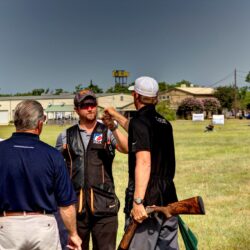This article was written in 2016, and while it does reflect the stage of knowledge and mindset I was in at the time — my own personal self improvement as a competitor, coach, and student of the game itself has influenced a change in some of the views expressed here. I am leaving this article up on my website, as it still is immensely valuable.
My previous Shooting Journal Release centered on “Visual Focus” – with this one, I want to take somewhat of a different approach. I want to talk about something that I have been working on this whole summer. That is; the “value” of each shot. I would like to add, that as of now, this is still an experimental theory in my shooting. I have no scientific evidence, other than what I have been experimenting with in my own shooting career this year – and I am still developing and perfecting it. But I will tell you, the results are unbelievable.
I want to first preface this with the idea that, unlike most all other “mental game” topics that are discussed, instead of taking a psychological approach to the mental side of shooting, I am going to be taking a philosophical approach. Philosophical approaches to the mental game are much more difficult to transfer into being effective – but once you can get over that hill, they have the potential to be much more powerful.
I am always searching for new ways to improve my shooting, and looking in very strange corners in order to do so. I feel like sometimes the more abstract ideas have the potential to be the best. That is, in essence, what this is.
Let’s take the topic of “pressure” as an example (which is what most of this Journal will be covering) – if we take a psychological approach to feeling pressure at the shot, we are by definition acknowledging the fact that we actually feel pressure during that shot – and then attempting to do something psychologically to “manage” that pressure so that it does not negatively impact the end result. In other words, taking a psychological approach to managing pressure requires the fact that there is perceived pressure to begin with – by recognizing that there is pressure, we give into our fear and create doubt in our own minds. In my opinion, there are at least two reasons why this is not a good way to combat pressure. The first being, as stated above, that we are recognizing the actual fact that there is an external situation in which we are currently in that is something in which we do not feel comfortable being in – which creates perceived mental discomfort (or pressure) while we are shooting. What is bad about this, is that by recognizing that exact external situation, we are subconsciously telling ourselves that, “this is something that I am less confident in”. So by recognizing pressure, we are actually creating that situation in our head – almost bringing it back full circle. What I mean by this is that, unless we recognize that situation mentally, it does not exist. By making it exist, now all of a sudden we require specific mental tools in order to manage it – that is where the psychological aspect of sports comes in. The second problem with this is the fact that by creating this situation, we have just diverted our focus to something other than the primary goal in shooting – breaking the target.
Let’s bring this into an actual scenario so that I can better explain what I am talking about. Imagine, after a week full of shooting, you find out (right before you arrive at your last station of the whole tournament) that if you break the next 8 out of 8 targets, you will win the World Championship outright. A 7 out of 8 brings you to a 12 person tie for Runner-Up, and of course a 6 out of 8 will bring you all the way down to sitting at 14th place. You walk up to the station and perceive it to be the toughest targets on the course. As you enter the shooting box, you tell yourself; “Okay just make sure you don’t miss any of these because you can win this whole thing!” You feel your heart beat, you start shaking, your hands start to sweat, you call pull, and in an effort to “make sure” you hit the target you check the lead and miss the whole first pair. Wow, that really cost you! Those targets were just worth a World Championship Title, and then a shot at Runner-Up, now you’re sitting at best 14th place.
Is any of that not true? Well, technically no – everything in that last passage is accurate. But what is debatable is the fact that those two targets were “worth” a World Championship title. Now this is just touching the tip of the iceberg. If you look at those turn of events in reverse order, you will notice that essentially all of the perceived pressure was in place because of the value placed on those two targets. If that value was not there, the pressure would have not been there either. If the value was placed on the physical/technical/mechanical application to the target, instead of the target itself (the process instead of the product) would it have changed the outcome? Possibly. If the value was placed on nothing, and instead the shooter would have done nothing different than what they have done all weekend to get them in that spot, would the outcome have been different? Most definitely, yes.
So now your question may be, “Well that’s great David, but what does that even mean and how do we do what you are saying?” Fair enough. The trick to this approach to the mental game is this; can you convince yourself of something philosophical? Rather than acknowledging instances in which we feel underprepared to accomplish, and then trying techniques to manage our thought process during those times (psychological approach), we are instead going to attempt to essentially convince ourselves that those situations do not even exist in the first place. This is huge, and it is extremely hard.
Try this, ask yourself; at the top level of competitive shooting why do people miss? You may come up with a variety of different answers. In fact, there are almost limitless amounts of answers to this question. My hold point was too close, the target beat me, I never saw it well enough, I took my eyes off of it, I stopped my gun, I pulled away at the end of the shot, I flinched, etc. I could go on and on about why people miss. But is that the real reason? Or is that essentially just the surface layer of why they miss? Now try this, ask yourself why you did any of the things that caused you to miss. Why did I stop my gun? Why did I flinch? Why did I take my eyes away from it? Why was my hold point too close? Keep doing this, and you will eventually arrive at one answer for all of those reasons. That answer is this; “because I was afraid to miss”. Simplifying it down even more; “fear”. The fear of missing – it’s a powerful thing.
Now I do realize, at a certain level of shooting that answer will not be the reason why somebody misses a target – but at the beginning stages of learning our game, the mental aspect is not what your focus needs to be on. This theory applies mostly to people who have mastered the technical/mechanical side of shooting.
So now we have to address where the fear comes from – and that is fairly simple as well. We don’t want to miss the target, because of the value placed on it. Essentially, we don’t want to miss, because if we miss, we don’t get what comes with breaking the target. We don’t want to fail. We don’t want to not win. But if we are shooting to win, we are shooting for something that is un-pure – we are shooting for something that is outside of the realm of what shooting actually is. Shooting is not winning. Winning is winning. The two things do not equal the same – in its purity, shooting is just shooting. That is all. There is no win, there is no lose – there is only playing by the rules in which define the game of shooting.
Given all of this, how do we do anything with it? Where do we go from here? What we first need to do is to actually define what shooting is. I believe that one mistake that we make when attempting to compete, is the way in which we define “sport”. We transfer our lives into how we play a game. What I mean by this is that we place external value on how we perform. We take value in which we have derived outside of the realm of “sport” and place it on the actions in which happen inside the realm of “sport”. What does that mean? Let me give you an example.
Rory McIlroy and Tiger Woods are both in a playoff to determine the US Open Champion – sitting on the final green, Rory misses a 10 foot putt for the win. Tiger sinks his 6 foot putt to force Rory to have to make his last putt to tie again. Rory addresses the ball and pulls the shot ending up missing left by an inch and giving the title to Tiger Woods. We would assume that that shot was worth the US Open – just like the shooting example above. It effectively cost Rory a huge win, possibly sponsorship contracts and a bunch of money. But is that true? Is that what sport is? No. Whether that shot actually made it into the cup or not, had absolutely zero consequences. The only consequences were the external consequences that we collectively decide to place on that shot. In the true sport of the game, in the immediate present moment, in the rules that define what “golf” actually is, did that shot have a consequence? No.
So what is the consequence that we put on it? What is the value that we place on it? And where does it come from? That answer is fairly simple, all of that value and all of those consequences come from us. We place them on that shot. So what does that mean? It means that in its purity, there is no value and there is no consequence. Whether that ball rolls towards and falls into the cup really does not matter, at all. In the sport of golf; making a put does not give you a US Open title, it does not give you a $1.2 million dollar check, and it does not give you a massive contract with major companies. In the sport of golf, making a put is just making a put. Hitting a ball is just hitting a ball. Translation to shooting; whether that target breaks or not has no meaning at all. Yes, it does if you want it to – but if you truly believe in what I just said, then it doesn’t. If you have the mental fortitude to convince yourself that breaking a target is just breaking a target, you have all of a sudden reduced the sport of shooting to its element – breaking the target.
So assuming that we are able to perceive competition in that scope of view, what does it allow us to do? The answer to this question is so simple that it almost has no explanation – it allows us to execute the perfect move to the target. It allows us to be free of added elements to shooting a target. It exponentially decreases the reasons for why we are shooting. Instead of doing it for anything external, we are now only shooting that target to shoot the target. Simple. There is no “routine” that you have to go through before every shot to get yourself to this level of thinking, you just do it. And it is so hard to do, but if you can, it works. You just have to understand that it is actually possible – and that that possibility is actually a truth, the purest truth to any competitive sport. There is no application process like a pre-shot routine or anything you would have to do if you were trying to “prescribe” a fix to a psychological situation. You are instead playing the game from a completely different point of view – a purest point of view.
This all sounds so complicated, I know. But in reality it is really simple. Can you reduce the sport of shooting to its most simplified form – and then play from that angle? Or can you not?









